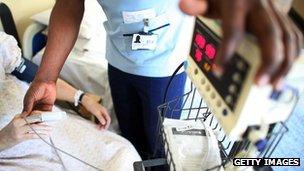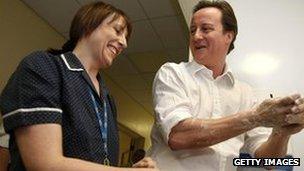How Scotland is leading the UK in clinical drug trials
- Published

The Scottish patient database has made clinical trials quicker and easier to set up
The last decade has seen a sharp fall in the UK's share of the global market in clinical trials losing out to China, Brazil and eastern Europe. But it looks like Scotland is bucking the trend and attracting big pharma back to Britain.
Jimmy Muir has popped into the diabetes clinic at Ninewells hospital in Dundee to get his eyes photographed.
The nurses want to ensure no new blood vessels are growing which can lead to blindness.
Jimmy is also part of a diabetes research study which measures blood vessels. He is one of a growing number of patients taking part in clinical trials.
"The support from the local population has been phenomenal," Andrew Morris, professor of medicine at Dundee University told BBC Radio 4's The Report.
Patient data shared
Scotland is doing better than the rest of the UK in getting trials up and running quickly, and it is thought it is all down to the unique computer system the country has.
From her desk Shona Brearly, manager of the Scottish Diabetes Research Network, can look at the data for any one of the 240,000 diabetes patients in Scotland.
GPs, nurses and hospital consultants can see the same information on the system which is updated every night.
"If you go to your GP this afternoon and the practice nurse takes your blood pressure, it's fed into the national system and I would see it this morning," Ms Brearly explains.
This is not the case in England where the different bits of the NHS use different systems.
"Very rarely can one get a complete view of the care of an individual," Prof Morris explains.
Research register
He believes the sharing of patient data in Scotland has benefited diabetes patients and he has the figures to back it up.
"Our amputation rate has fallen by 43% in six years," he says, adding that eye disease, which can cause blindness, has also fallen by 40%.
The patient database has also had a big impact on clinical trials.
Many of the diabetes patients have agreed to be on a research register which means suitable candidates for a trial can be found quickly.
The alternative would be manually going through sets of notes.
"To find one clinical trial patient you would have to look through 80 to 100 sets of notes to find one patient that is suitable," Ms Brearly says.
Using the research register, the same search can be done in 10 minutes, making Scotland a viable global competitor.
Global player
Just how quickly patients can be recruited is a major factor for pharmaceutical companies in deciding where to run trials.
Ms Brearly is proud of Scotland's record. She recounts how in a recent global trial she was given 18 months to recruit 10 patients.

The government has announced a £200m investment in health research in Britain
"We used the research register, the nurse phoned 10 patients who all agreed… so we recruited the patients in less than two weeks. The fastest in the world."
Getting trials approved in the first place is another bugbear for the pharmaceutical industry.
A February report into health research by the Academy of Medical Sciences stated that bureaucracy and a "risk averse culture" within the NHS in England was leading to unacceptable delays in getting trials started.
It has seen major pharmaceutical companies, including Britain's biggest GlaxoSmithKline (GSK), cut back on the number of trials it runs in Britain, opting instead for Eastern Europe or China.
GSK's UK medical director Dr Pim Kon says speed is the criteria for trials; how long it takes to set up a trial and how quickly patients can be recruited.
"I don't think we do particularly well at either of them," Dr Kon says.
Delayed approval
This was clear from some of the evidence submitted to the Academy of Medical Sciences.
Cancer Research UK said on average it was taking 621 days to get approval and patients recruited onto trials.
The Life Sciences Strategy unveiled by the UK government earlier this month has set a target of 70 days to approve trials.
The Scottish government has already invested money to streamline the bureaucracy and speed up the approvals process.
"Current times for commercial trials in Scotland is 16 days for approval," Ms Brearly says, far faster than in England.
She says it has made Scotland "very attractive" to pharmaceutical companies.
Last year there was a 40% increase in the number of commercial diabetes trials conducted in Scotland which brought in an extra £1m for NHS Scotland.
Scotland is already developing similar databases for other illnesses including cancer and cardiovascular problems, aiming to get more patients onto trials.
Next generation
The closer monitoring and use of the newest treatments means that patients in trials tend to have better outcomes than those who do not take part in research.
Helen Wilkinson is six months into her trial of insulin injections and has already signed up for another trial when this one finishes.
She feels it has allowed her to "take ownership" of the diabetes.
"Anything I'm doing now as regards research will help the next generation and hopefully the generation after that," she explains.
The UK government hopes the streamlining of bureaucracy and the setting up of a patient database similar to Scotland's can retain the billions of pounds the pharmaceutical industry invests in Britain.
Prof Morris says if the UK can improve on speed, quality and cost it could compete with China, India and Eastern Europe.
"There is some hope in repatriating some of the trial activity which is currently being performed elsewhere in the world," he says.
The Report is on BBC Radio 4, external on Thursday 22 December at 20:00 GMT. Listen to the full programme via the Radio 4 website or download the programme podcast.
- Published5 December 2011
- Published5 December 2011
- Published4 December 2011